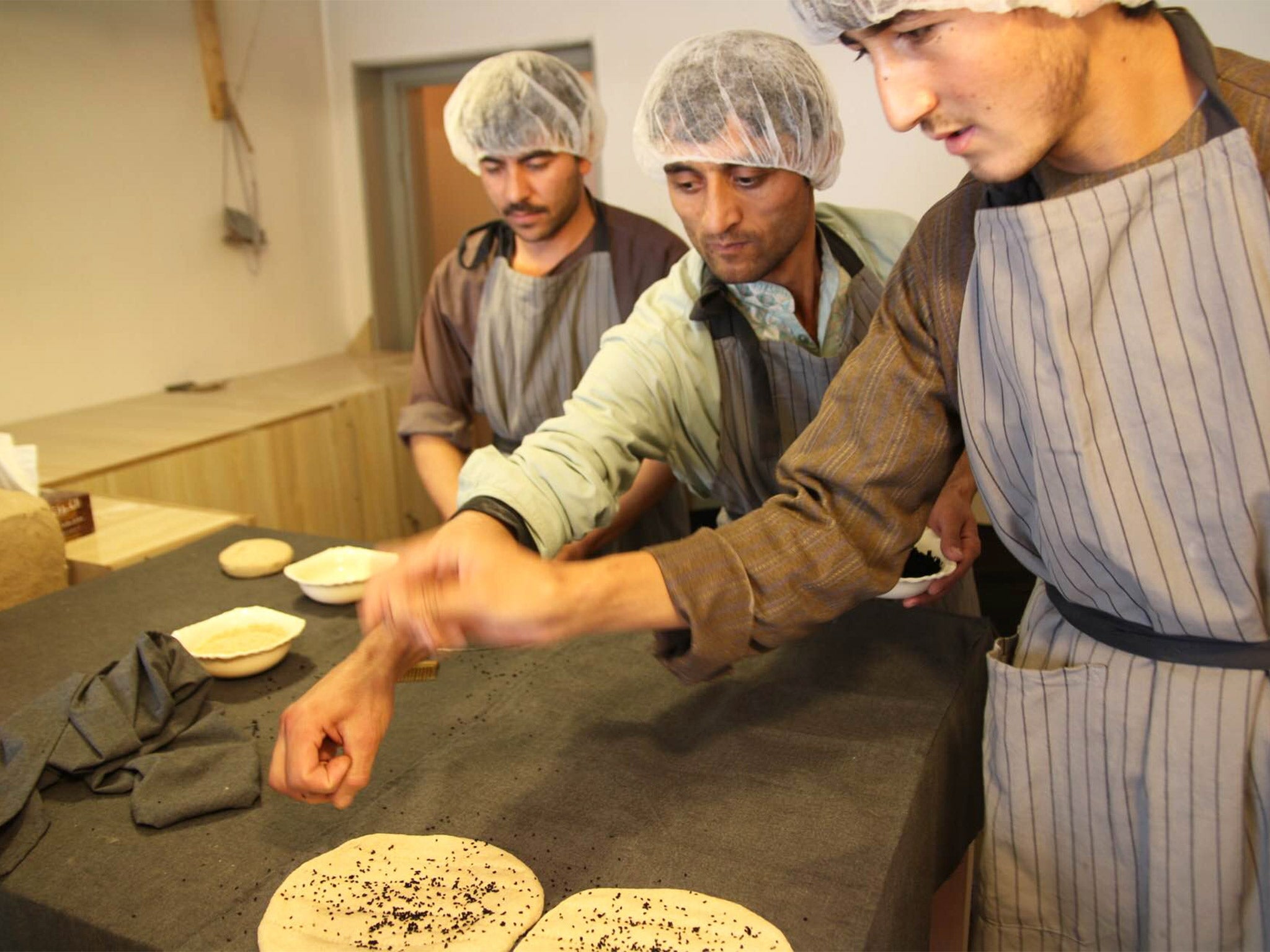Afghanistan: Kabul bread shop defies the economic gloom to thrive even as fighting with the Taliban increases
Two young entrepreneurs have taken a small step that they hope will sow the seeds of a greater change for their country

Your support helps us to tell the story
From reproductive rights to climate change to Big Tech, The Independent is on the ground when the story is developing. Whether it's investigating the financials of Elon Musk's pro-Trump PAC or producing our latest documentary, 'The A Word', which shines a light on the American women fighting for reproductive rights, we know how important it is to parse out the facts from the messaging.
At such a critical moment in US history, we need reporters on the ground. Your donation allows us to keep sending journalists to speak to both sides of the story.
The Independent is trusted by Americans across the entire political spectrum. And unlike many other quality news outlets, we choose not to lock Americans out of our reporting and analysis with paywalls. We believe quality journalism should be available to everyone, paid for by those who can afford it.
Your support makes all the difference.Businesses are closing, international aid agencies are winding up their operations and thousands of Afghans are fleeing abroad in search of better lives as fighting with the Taliban increases.
But in a country where big plans often collapse, two young entrepreneurs have taken a small step that they hope will sow the seeds of a greater change.
Suleman Fatimie and Shakib Noori, both management graduates from Pakistan’s Preston University, have given up promising careers and invested their life savings in a bakery in the Afghan capital – despite the World Bank’s most recent official assessment describing the country’s medium-term outlook as “unfavourable”.
Growth is unlikely to exceed 2 per cent, a sluggish rate compared with other Asian economies, the bank believes, and according to some estimates, some two million Afghans are unemployed.
“We thought hard – how can we help change the situation?” said Mr Fatimie, who was previously chief executive of Afghanistan’s export promotion agency. “A good, sustainable business has the power to improve lives of those involved. So, we decided to set up a venture.
“A bakery was a natural choice as Afghans are fond of food – and most are addicted to bread.”
Mr Fatimie and Mr Noori invested $30,000 (£20,700) to set up the bakery which they named Khanagi – which means “home-made” in the Dari language. It is barely visible in the shadows of supermarkets, hotels and banks at the centre of the plush Kabul neighbourhood of Shar-e-Now. But the powerful aroma of freshly-baked naan, the flat bread that is an Afghan staple for breakfast, lunch and dinner, fills the street whenever customers open Khanagi’s glass door.
Inside, the head cook Shir Mohmmad and his four assistants roll balls of dough and flatten them between their palms before plastering them on the walls of a clay oven. “The naan, in a way, reflects the character of Afghans,” said Mr Mohmmad as one of the assistants peeled cooked bread from the oven walls using an iron rod. “Crisp on the exterior, but soft inside.”
Khanagi had many firsts to its credit, Mr Mohmmad said. “It’s the only bakery in Afghanistan that is committed to good taste and health at the same time. We only use whole grain for our breads,” he explained. “And we are the only bakery in Afghanistan that does home delivery.”
In the space of a few weeks since its launch, the tiny one-room bakery has created an entire business ecosystem that is helping to rebuild bonds within the local economy and generate employment.
Khanagi only uses grain grown by Afghan farmers, and obtains its fruit jams, milk, cottage cheese and seasonal side dishes from local producers. It has given direct employment to 11 local residents and created about 100 other jobs at its suppliers.
Jamal, a 21-year-old student of philosophy at Kabul University, is among those who have benefited from the venture. “I was about to leave for Europe to seek asylum, just like my friends,” he said. “I didn’t see any future here. My parents couldn’t afford to pay my college fees and there was no job for me.
“Then I got a call from Khanagi. They were looking for a manager who could also take orders over the phone.”
Jamal, who uses only one name, got the job from among dozens of applicants. “My life has taken a complete turn. I was paid my first salary – 10,000 Afghanis (about $153) at the end of December. I plan to use the money to pay my college dues. I will have education, job and money. I now see hope.”
Facebook and Twitter have helped to spread the word about Khanagi. “We get dozens of calls every day from young men, small business owners and entrepreneurs who are keen to learn from our experience,” said Shakib Noori, the other co-founder of Khanagi, previously Afghanistan’s economic attaché to the US.
“We have had a bubble economy in which donor funds have been running businesses. They have now gone. In a way that is good because now people are thinking about setting up businesses that are sustainable.
“Look at Khanagi. It’s been just a few weeks and we are already getting orders for 1,000 breads a day. My only advice to Afghan entrepreneurs is ‘Think small, do small.’ And then big will follow.”
Join our commenting forum
Join thought-provoking conversations, follow other Independent readers and see their replies
Comments